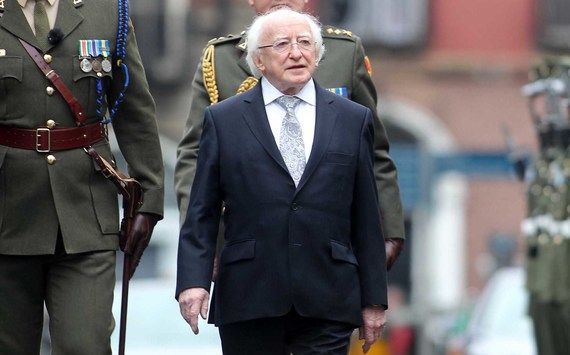Irish President Michael D. Higgins has claimed that the British must face up to their history of reprisal-based violence on the centenary of one of the most violent reprisals of the Irish War of Independence.
Higgins wrote at length on the anniversary of the Sack of Balbriggan, when crown forces destroyed factories and a whole street of houses on the eve of Sept. 20 and the morning of Sept. 21, 1920.
Around 150 Black and Tans went on the rampage in Balbriggan in response to the IRA murder of RIC District Inspector Peter Burke and the wounding of his brother Sergeant William Burke in a bar in the town earlier in the day.
The Black and Tans burned down the large Deeds and Templar hosiery factory in the town in addition to 49 houses and four pubs.
Meanwhile, two men, Seán Gibbons and Séamus Lawless, were dragged away to Quay Street and savagely beaten to death despite protesting their innocence.
The Deeds and Templar factory employed almost 400 people directly and indirectly and Higgins said that its destruction decimated the town of Balbriggan.
He said that the Black and Tans ruthless attack on the town was part of a policy of "strategic violence" against the rebellious Irish.
"From the summer of 1920 onwards, British forces consistently responded to IRA activities by attacking factories and co-operative creameries," Higgins wrote.
"For example, by the time a truce between the IRA and the Crown forces came into effect, 40 co-operative creameries had been destroyed, with another 35 rendered unfit for work. The destruction of each creamery put an estimated 800 farmers out of business."
The President said that reprisal-based violence was a key strategy during the War of Independence but said that the strategy was by no means unique to the Irish struggle.
He pointed to the use of similar tactics in India and Cyprus during similar uprisings in the mid-20th century.
Higgins said that the strategy was rooted in the British psyche that they were superior to other races.
"Their use is rooted in ideological assumptions, of superiority and inferiority in terms of race, culture or capacity, in the notion of the collective as a disloyal, hopeless or threatening version of the ‘Other'".
Reflecting on the War of Independence, Higgins noted that intellectual tradition in Britain perceived Irish people as inferior and he quoted Scottish philosopher David Hume's History of England.
"The Irish from the beginning of time had been buried in the most profound barbarianism and ignorance; and as they were never conquered, even, indeed, by the Romans from whom all the Western world derives its culture, they continued still in the most rude state of society and were distinguished by those vices to which human nature, not tamed by education, nor restrained by laws, is for ever subject."
The President additionally quoted Winston Churchill, who also viewed the Irish as a less intelligent race.
Read more: Former British MP says British ignorance of Irish history is "shocking"
"Indeed, a century later, Winston Churchill would write, “We have always found the Irish to be a bit odd. They refuse to be English”. The ‘othering’ of Irish people and their culture was undeniably ingrained at all levels of British society."
Higgins said that it was important that the British recognize their previous relationship with Ireland and how they viewed them as inferior if the two nations were to heal from the wounds of the past.
"If we are to be serious about ethical remembrance and the creation of diverse, complex, shared memory at peace with the past in the interest of a present or future understanding, it is important to recognize these facts. It constitutes a prerequisite for any meaningful healing."
He said that such acts of violence, like the attack carried out by the Black and Tans in Balbriggan in September 1920, would be viewed illegally by today's standards of war and conflict.
"Indeed, collective punishments and reprisals are now considered violations of the laws of war and the Geneva Conventions, the standards of international law for humanitarian treatment in war."
Forgiveness is difficult, but not impossible, Higgins said, and he claimed that Irish people must try to avoid bitterness.
He said that persisting bitterness would intensify conflict, rather than resolve it and he quoted the late John Hume, who once said: "An eye for an eye leaves us both blind."
However, he claimed that British recognition of the atrocities committed during the War of Independence was essential to avoid bitterness.
"It is only through such forms of ethical remembering that we can avoid retreating to the blinding categories of censure or denunciation, or indeed revenge and bitterness, that blighted this island for so long.
"Let us all continue with, indeed embrace, the new beginning that the Belfast (Good Friday) Agreement represented as we continue to carve out our peaceful co-existence on the island of Ireland."
Read more: GAA marks centenary of Bloody Sunday with series of commemorative events




Comments